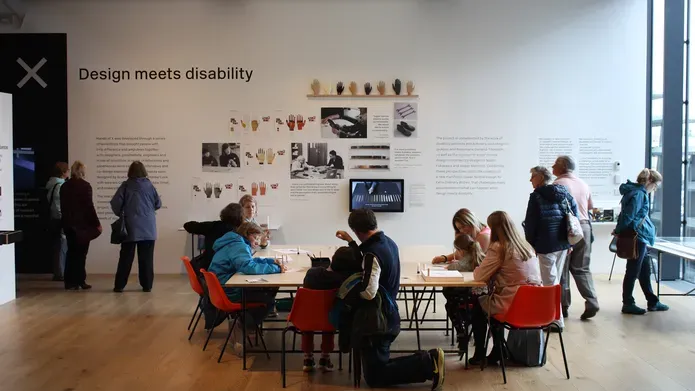Case study
Design meets disability
Challenging conventional approaches to disability through inclusive design practices and human-centred research.
Published on 12 May 2022

Research at the Duncan of Jordanstone College of Art and Design (DJCAD) is challenging established thinking around disability as a ‘problem’ to be solved. By bringing together critical disability studies expertise with creative and inclusive design practices, researchers are changing approaches to disability objects such as prosthetic limbs and augmented communication, demonstrating that disability can be a catalyst for creativity, rather than a cause for compromise. And that design can be a mode of inquiry, exploring and embodying disabled identities and engaging more nuanced conversations.
Professor Graham Pullin’s experience as the head of an interdisciplinary design studio in industry led him to propose approaching disability design in new ways. Having previously worked in medical engineering developing robotic arms, he saw an opportunity to complement the ‘problem solving’ mindset that dominates approaches to assistive technology. His research – published under the title Design meets Disability – uncovers the contrasting and sometimes contradictory approaches taken by technology-driven and design-driven cultures and demonstrates the opportunities to create positive outcomes when research is allowed to be more exploratory and critical, yet directed by the stances of disabled people in a human-centred approach.
The EPSRC funded project Hands of X (led by DJCAD in conjunction with UCL) was guided by disabled participants who became co-researchers and mentors to the project team. The work was exhibited at the Cooper Hewitt Smithsonian Museum of Design in New York during 2017-2018, and later formed the basis for the exhibition Hands of X: design meets disability at V&A Dundee between June and September 2019, where it was seen by an estimated 140,000 visitors.
The work has focused on the idea of the ‘super ordinary’, highlighting issues of choice for people “who don’t want to hide their disability, but also don’t want to become poster children for some futuristic, superhuman narrative” and helped to shift the culture around disability by engaging people in discussion in ways that avoid being dominated by technical or clinical issues. Conventional approaches to prosthetic limbs have prioritised medical functionality with little thought given to aesthetics. In response to this research, a genesis of new design-led businesses is changing the conversation, leading to greater choice of self-expression for users of prosthetic limbs through fashion focused prosthetic covers.
The research is also being used by the global business collective The Valuable 500 to promote disability inclusion. In conjunction with disability activists, the movement is working to promote the cultural and creative benefits of embedding inclusivity in business practice and is put disability on the business leadership map. To date nearly 400 CEOs in 31 countries have committed to putting disability inclusion on their leadership agenda, thus promoting inclusion and best practice around disability on a global level.
Find out more about how design meets disability and our Studio Ordinary

UN Sustainable Development Goals
The Research Excellence Framework (REF) is the system for assessing research in UK Higher Education Institutions (HEIs).